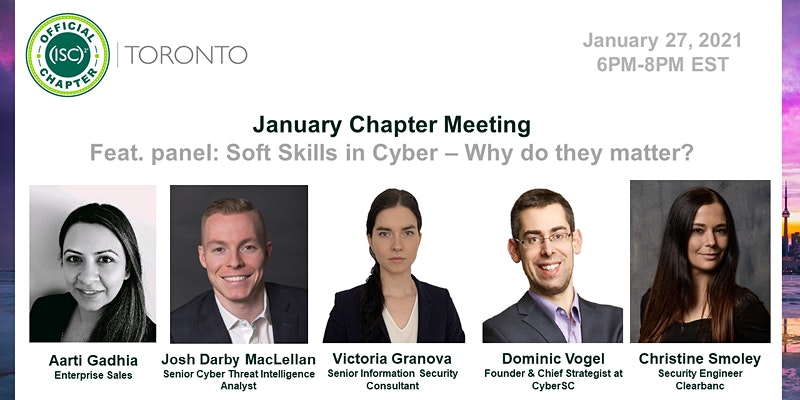
The (ISC)² Toronto Chapter meeting: why do soft skills matter?
Alanna Fairey
News (ISC)² Toronto Chapter editors pick soft skillsThe session focused on the importance of having the necessary soft skills when considering a career in cybersecurity

The (ISC)² Toronto Chapter hosted a virtual meeting on Jan. 27 featuring a session that explored the importance of soft skills when considering a career in cybersecurity.
The session, titled “Soft Skills in Cyber — Why Do They Matter?” was moderated by (ISC)² Toronto Chapter president Victoria Granova.
The panelists included:
- Josh Darby MacLellan, director of professional development, (ISC)² Toronto Chapter
- Christine Smoley, security engineer, Clearbanc
- Dominic Vogel, founder & chief strategist, CyberSC
- Aarti Gadhia, cybersecurity sales professional and champion for Women in STEM & Leadership
“We’re humans — we’re not robots,” Vogel said when asked why soft skills are important in cyber. “We call them soft skills, but I think they’re human skills. The more we humanize ourselves the more in tune we are with our humanity and those foundational skills.”
Gadhia expressed similar sentiments. “In my opinion, [soft skills] are life skills,” Gadhia said. “You need life skills every day, and that’s why they’re really important. In cybersecurity or life in general, soft skills are very important for day-to-day events and through practice you get better at whatever you’re doing.”
While the panelists all agreed that soft skills are important, they also noted that it is often a challenge to teach them to employees. Smoley argued that the best way cyber professionals can develop these skills is for security managers to encourage their teams to practice them in the field.
“One great way we can help build soft skills in our team is simply trusting them with decisions and situations where they get to exercise their judgement — practicing the skill of discernment will also build up their confidence in their own judgement. Bring them into situations where it’s not overwhelming, but perhaps they need to go find some information themselves,” Smoley reasoned. “Your team can build up these skills, managers can mentor them and build them up in a way that they can then become the next generation of mentors.”
Elaborating on the theme of mentorship, Darby MacLellan shared that he did not see the value of having a mentor until he began his career.
“I realized that I don’t know a lot about a lot,” Darby MacLellan said. “Having multiple mentors really helped guide my career not just in the kind of technical sense, but more in soft skills side of things. I would encourage everyone to seek out mentorship.”
To conclude the session, the panelists offered some parting advice for attendees: be persistent, find and be a mentor and advocate for more diversity in the industry.
“If someone says that you’re not good enough or you don’t have technical skills, challenge them and speak up,” Gadhia concluded. “Challenge people as you’re going through this, and don’t let this be a barrier.”
Print this page
Leave a Reply